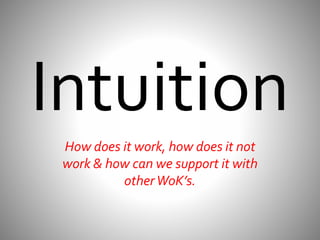To presentation
- 1. Intuition How does it work, how does it not work & how can we support it with other WoK’s.
- 2. Definition • Knowledge or belief obtained neither by reason nor by perception. • Instinctive knowledge or belief • A hunch or unjustified belief
- 3. Three different types • Core intuition: - Our most essential intuitions about, life & basically everything. • Subject-specific intuition: - Intuitions in several areas of knowledge, such as science & ethics. • Social Intuition: - Our intuitions about other people. That is what we are going to focus on
- 4. When do we use our intuition? • Intuition plays a big role in our everyday life • When reasoning is used • .( we use our intuition when we use perception) • So the both depend on intuition. That means we can not have only reason or perception without our intuition .
- 5. How much can we rely on our intuition? • If your intuition matches with reason & experience as well as others intuitions, then it’s probably more reliable than if they do not. Example: http://www.youtube.com/watch?v=_SsccRkLLzU
- 6. Conclusion • All of our knowledge tools are double edged. • Can both contribute to our knowledge and be an obstacle to it. • To establish the truth we must test one against the other and not rely on one only Ways of knowing.





